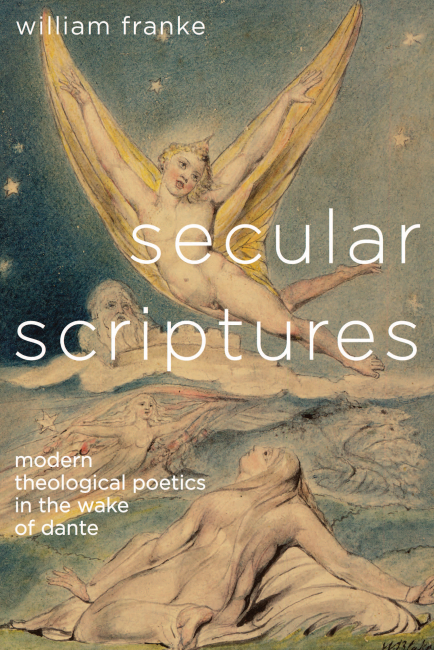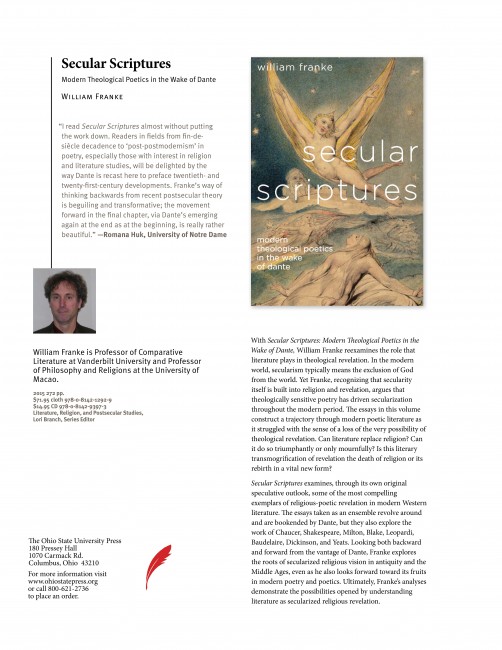Secular Scriptures: Modern Theological Poetics in the Wake of Dante
Secular Scriptures: Modern Theological Poetics in the Wake of Dante
Link to publishers web page about this book
“In a series of dazzling essays taking Dante as their starting point, William Franke finds the trace of religious meaning throughout different forms of modern poetry, whose gaps and discontinuities he claims point to the ineffable beyond language. The book will prove an immense provocation and stimulus to all those who thought they had sorted out the relation of theology to modern poetry.” —Jeremy Tambling, University of Manchester
“In twenty-five years of teaching a ‘great books’ curriculum, I have rarely read a study so finely attuned to the spiritual resonances of classic texts. I will be consulting William Franke’s Secular Scriptures for as long as I continue teaching and writing about the religious dimension of literature, and its enduring relevance to our ‘secular age.’” —Paul J. Contino, Pepperdine University
“In Secular Scriptures, William Franke rejects the received wisdom that sacred and secular are essentially opposed to one another. He does this by asking us to think about where these alleged oppositions in fact converge—in a venerable Western literary tradition. Surveying a broad spectrum of works written ‘in the wake of Dante,’ he argues that ‘self reflexivity,’ subjective human experience and reflection, has become for modern poets the locus of revelation, a form of scripture. Building on his extensive previous explorations of ineffability, ‘on what cannot be said,’ he uncovers the richness—both literary and philosophical —of inventive language that speaks in order to reveal ‘the spiritual mysteries of the letter,’ to gain access to what ultimately lies beyond the reach of words.” —Peter Hawkins, Yale Divinity School
“I read Secular Scriptures almost without putting the work down. Readers in fields from fin-de-siècle decadence to ‘post-postmodernism’ in poetry, especially those with interest in religion and literature studies, will be delighted by the way Dante is recast here to preface twentieth- and twenty-first-century developments. Franke’s way of thinking backwards from recent postsecular theory is beguiling and transformative; the movement forward in the final chapter, via Dante’s emerging again at the end as at the beginning, is really rather beautiful.” —Romana Huk, University of Notre Dame
“William Franke has written, in a luminous prose, an enthralling book about a pivotal issue in literary studies: the esthetics of visionary literature. The questions Franke raises—philosophy of language, the nature of mystical insights, their modes of representation, and the revelations of poetic knowledge—find in Dante, in the Romantic poets of Europe, and in the radical philosophical speculations of the twentieth century a fascinating articulation through which the reader can experience the depths of the high culture of the West.” —Giuseppe Mazzotta, Yale University
Authorial Intentions: Interview with Chris Benda
Podcast Interview with Chris Benda on Secular Scriptures (with participation of Chance Woods)
Chad Schrock in Literature and Theology
Katherine Eggert, Studies in English Literature:
“William Franke is similarly concerned with the status of the materiality of the image. As part of his argument in Secular Scriptures: Modern Theological Poetics in the Wake of Dante, Franke argues that Milton’s religious commitments lead him to reclassify poetic imagery as “nonsacramental.” . . . his comments on Paradise Lost’s substitution of poetic evocativeness for poetic transcendence are key to his book’s thoughtful series of essays, which stretch all the way from Dante to W. B. Yeats.” — Katherine Eggert, SEL 57/1 (Winter 2017): 189-91
Link to publishers web page about this book
Link to Newberry Center Annual Dante Lecture


©2026 Vanderbilt University ·
Site Development: University Web Communications